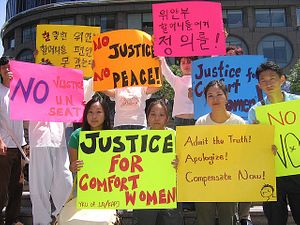Even as Japanese Prime Minister Shinzo Abe, on October 1 before the Lower House of the Diet, reaffirmed that there would not be any challenge or replacement of the Kono Statement, trouble appears to continue to simmer over the issue. The Kono Statement was issued in 1993 by then Chief Cabinet Secretary Yohei Kono, in which Japan made a formal apology for the systematic use of “comfort women” during the Second World War. Despite Abe’s reassurances, there are other statements swirling about (some from Abe himself) that cloud the intention and sincerity of his comments.
A large part of the recent confusion stems from articles written on the subject by the Asahi Shimbun in the 1980s and 90s. In those articles, a former soldier in the Japanese Imperial Army named Seiji Yoshida described forcing women on the Korean island of Jeju to work in military brothels. The articles were retracted because scholars later cast doubt on the soldier’s story that the Asahi could not rectify. After the newspaper made public its mistakes in early August and retracted the articles, several government officials used the incident as grounds to claim that Japan’s wartime history has been unfairly portrayed by the media.
Indeed, Abe has been among officials who have said there is no proof that the Imperial government directly ordered the kidnapping and forced prostitution of the women within its conquered territory. On October 3, shortly after he said there would be no replacement of the Kono Statement, Abe again addressed the House of Representatives and said the Asahi stories had slandered Japan, and that the issue from now on should be based on fact.
To provide slightly more context, four American experts that helped to draft a 2007 U.S. congressional resolution saying that Japan “should formally acknowledge, apologize, and accept historical responsibility in a clear and unequivocal manner for its Imperial Armed Forces’ coercion of young women into sexual slavery,” have weighed in after the Asahi retraction. Their response in The Nelson Report said that the Yoshida testimony did not influence the issue from the U.S. perspective, saying the facts “will refute the view of the Japanese history revisionists and the Abe Administration that the Yoshida memoir, as reported by the Asahi Shimbun, colored all understanding of the comfort women tragedy,” adding “we are further troubled that the Abe Administration appears to adhere to this view.”
Even as Abe has publically said that the Kono Statement will not be retracted, a close personal aide has made statements to the press that indicate a new statement by the prime minister might supersede it. On October 6, MP Koichi Hagiuda, who is a special advisor to Abe within the ruling LDP, said “We do not intend to review the Kono Statement as it has already finished its role.” However, he followed by saying “Next year marks the 70th anniversary of the end of World War II. By issuing a new statement, we would let [the Kono Statement] be emasculated.” Abe plans to commemorate the 70th anniversary of the end of the Second World War next year with this official statement. Statements from those close to Abe that the Kono Statement has “finished its role” and will be “emasculated” do not inspire confidence that Japan will continue to accept responsibility for its past wartime crimes. Even as Chief Cabinet Secretary Yoshihide Suga suggested that Hagiuda’s comments were simply the personal opinion of a lawmaker, the space for ambiguity created by the Japanese leadership will do little to increase trust in Japan’s regional partners, as it seeks to improve damaged ties that are partly attributable to this very issue.

































